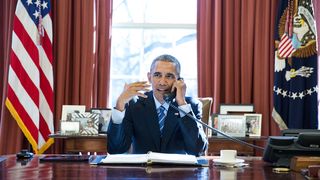Barack Obama became president at a very challenging time: the US was in the grip of the most destabilising economic crisis since the Great Depression and was bogged down in two long-running wars. While Obama campaigned to be a transformational leader like FDR or Ronald Reagan, in practice he governed as a restorative president.
After the bad decisions and neo-conservative hubris of the Bush Administration, Obama returned US foreign policy to a more stable status quo footing. Although Obama’s progressivism was on display in his speeches about the need for religious tolerance and action on climate change, he governed as a pragmatist who was more aware of the limits of US power than his immediate predecessors.
Although Obama should be praised for his cool and prudent approach to foreign affairs, his legacy may well be short-lived. Despite his famed eloquence, he was unable to explain to the American people the benefits of his globally engaged but prudent foreign policy rooted in the liberal-realist outlook that has been dominant since 1945.
This is not just a failing of Obama’s, but one shared by many elites, including Hillary Clinton. This liberal-realist outlook is committed to the US engaging deeply in the world both economically and diplomatically and believes in the institutions and international order created largely by the US at the end of World War II. It also rejects the need for isolationism or extensive protectionism due to a belief that in any competition—be it political, economic, or military—the US will eventually win because of its exceptional values, people and resources.
The election of Donald Trump significantly challenges this internationalist outlook. It’s a reminder that complicated foreign affairs including the US economic partnership with China need to be continuously explained and justified to prevent simplistic ideas—like casting China as America’s economic enemy—from taking hold.
US-China relations
Obama is likely to be missed nowhere more so than in his no drama approach to US-China relations. Since the presidency of Bill Clinton, China and America have reached a remarkable level of economic co-dependency. While the benefits of this relationship have been mixed, it has vastly reduced the potential for the type of great power conflict that was predicted by experts like Hugh White and John Mearsheimer. Of course, this economic partnership has come with costs, most notably to the global environment and to manufacturing jobs in the US. The loss of these jobs, part of a wider process of increasingly globalised production and trade, has squeezed the American middle class and has particularly impacted negatively on the career prospects of Americans without university education.
What could Obama have done to address this? He should have stuck more to FDR’s playbook by making the case more effectively, although admittedly to a largely hostile Congress, for a bigger stimulus programme in 2009 and a lot more spending on infrastructure. Our guess is that Trump’s popularity and possible re-election could rest on getting the Congress to approve his plans for massive infrastructure spending.
The other legacy at stake regarding US-China relations is the environmental agreement struck between the two nations in Paris in 2016. Once again the benefits are complex to explain and Barack Obama and Hillary Clinton failed to effectively sell this policy triumph to the American people. The Paris targets could now be rejected by the Trump Administration. Thankfully, many of America’s largest states, particularly California, are committed to sensible greenhouse reduction targets.
The Middle East
Obama’s foreign policy in the Middle East was to be guided by his campaign promise that he would get America out of its long war in Iraq. For those sceptical of campaign promises, it is worth noting Obama’s other key promises were to use drones to pursue terrorists into Pakistan and to negotiate with Iran. The fascinating question on Iraq is: did Obama leave in the correct manner, and was the nature of the US exit partly responsible for the rise of ISIS? While this seems a terribly unfair question at first glance, it must be asked whether his administration pushed hard enough for political power-sharing in Iraq, which could have reduced sectarian violence and stunted the growth of ISIS. In fact, there is evidence to suggest that the rush to leave Iraq led to his administration unwisely supporting Prime Minister Nouri al-Maliki who increasingly became an impediment to power-sharing.
Criticism of a similar nature can be levelled at Obama’s response to the Syrian civil war. Once again, there is no easy solution—all US action would have potentially negative consequences. Yet some say that US intervention in Libya led to the anti-Assad forces in Syria having unrealistic expectations about their capacity to overturn the Ba’athist government. The results of the civil war, where Assad has brutally responded to the rebels and the rise of ISIS, have led to a death toll that The New York Times has recently estimated to be over 400,000, including a very high proportion of civilians. This conflict in Syria has also led to an international refugee crisis, fuelling nativist and populist politics across the Western world.
What could Obama have done better in Syria? He could have advocated a greater emphasis on the Responsibility to Protect (R2P) in NATO and at the UN. This is a wicked conflict that is likely to haunt Obama in the way that the Rwandan genocide haunted Bill Clinton once he left office, because of a sense that surely more could have been done to save lives.
In sum, the Obama presidency is likely to be sorely missed by many Americans and non-Americans in the years ahead. His cool, calm and collected approach to foreign affairs was reassuring for many and it resulted in America’s standing across the world largely being restored, with Israel and Pakistan being two exceptions to Obama’s widespread international popularity. This is not to say that Obama always made the right choices, but on balance his record is impressive.What lies ahead with the Trump presidency is largely unknown. What we do know from Trump’s campaign is we will go from no-drama Obama to all-drama Trump.






